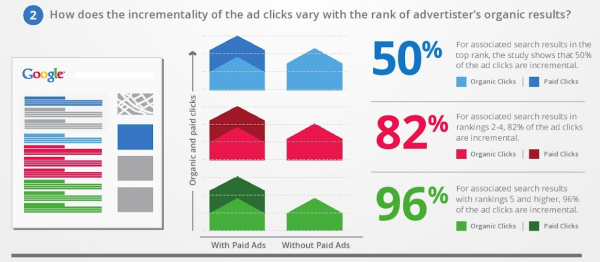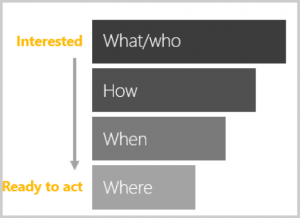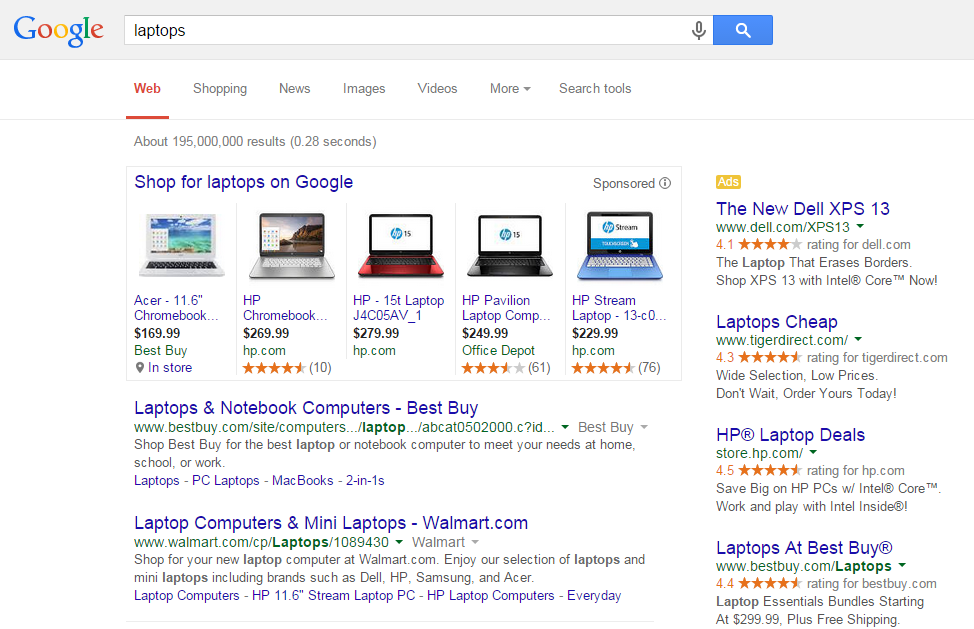As search marketers, we tend to focus so much on keyword optimization that we often neglect the bigger picture. Search is quite simple, yet very complex at the same time. We spend a large amount of time analyzing algorithms, keywords, and results, but how much time do we spend thinking about the search process itself? At the heart of all of the search behaviors we’ll be discussing, lies the underlying question, why do people search? How are they searching? Do searches vary on different devices? How do users interact with paid results? We will cover all of these questions and more. Understanding the psychology behind the search process will make you a much better advertiser and search marketer. Once you grasp how your target market is searching, you can more effectively reach and keep those users.
Basic Search Psychology
Why do people search? The answer is rather simple. People search because they’re looking to find the answer to a question. It’s that simple. It gets complicated when you begin analyzing how users go about finding their answer. The number of different search queries that a user could input and come up with an answer to one question are potentially in the thousands.
For instance, if someone wanted to buy a new laptop in Rochester, MI, they could type any of the following search queries:
- new laptops
- cheap laptops
- electronic store Rochester
- laptops Rochester
- Best Buy
- Dell
- HP laptops
- Gateway laptops
There are even more possibilities than that. Nonetheless, this brief list shows just how many different ways a user can go about looking for an answer to one question. The job of the search marketer is to match users’ potential search queries with their web pages by optimizing for keywords. We tend to focus a lot on keywords, but that’s often done out of neglect for the search queries. We’d make the argument that more time should be spent analyzing search queries. It’s important to note that keywords and search queries aren’t the same thing. Keywords for the purpose of SEO, are words or phrases that are used to describe the content of a web page. On the other hand, search queries are words or phrases that users type into a search box to pull up a list of results. With a full understanding of how users are searching, you can then optimize your pages for them. Your web pages are a solution to a certain set of questions. The ultimate goal for you is to figure out what questions you answer and how you get your answer in front of the people that are looking for it.
Search Query Formats
Search queries can be categorized into three different classes:
- “Go” Navigational Queries: These searches are conducted when users want to go to a specific site. Examples would be searching “TippingPointUS.com” or “MajicWindow.com.”
- “Do” Transactional Queries: This is a query that is used with the intent to complete a transaction. Transactional searches can be searches for specific brand names like “Apple iPhone 6” or a more general search for products/services like “headphones.” Transactional searches will often include action keywords like “buy,” “purchase,” or “order.”
- “Know” Informational Queries: These searches typically cover a broad topic. With informational queries, users aren’t looking for a specific site and they aren’t looking to make a transaction either. They’re simply looking for information. Information could include answers to a question or an educational how-to guide.
All searches fall within one of these three categories. A study from Penn State found that 80% of all searches are informational in nature, whereas 10% are navigational and another 10% are transactional. What does this mean? Content truly is king and should be a large focus within your digital strategy. If you don’t already have a content writer at your disposal, you should certainly invest in one to bring traffic to your website from the 80% of search users that are looking for information.
How do you optimize for navigational queries?
Unfortunately, it’s very difficult to optimize for navigational queries because the user has an exact site in mind and if you’re not that site, then you’re probably not of much use to the user. However, some queries that appear to be navigational in nature may not be. For example, someone who googles “Twitter” may just be looking for Twitter related news or information rather than the actual website. The goal for navigational queries is to own your brand’s navigational query. Ideally, your site should appear as both the top paid result and the top sponsored result. While it may seem counterintuitive to pay for keywords you already rank organically for, it’s incredibly beneficial to do so. Sponsored ads for branded keywords tend to drive higher click and conversions which in turn leads to increased revenues.
How do you optimize for transactional queries?
Transactional queries come from users who are at the end of the conversion funnel. With transactional searches, you can safely assume the user is intending to make a purchase in the near future, if they’re not already pulling out their credit card. Vertical searches are a subset of transactional queries that represent people looking to make a transaction within a specific industry. To effectively rank for transactional queries, it’s best to use a two pronged approach. On one hand, you’ll want to target transactional queries using organic content like optimized product pages and local SEO strategies. On the other hand, you’ll also want to utilize pay-per-click advertising to target the transactional keywords that are the most relevant to your industry. Sponsored ads perform extremely well for this kind of query because users are looking for a specific type of product or service to buy and a sponsored ad is just as likely to provide what they’re looking for as an organic result. Sponsored ads are also more enticing because they can include a picture along with additional plug-ins like Skype call support.
How do you optimize for informational queries?
As we had briefly talked about earlier, the best way to target informational queries is through developing high quality SEO content that contains genuinely helpful information relevant to the specific search query. Take some time to come up with questions that are relevant or related to your industry and address them with a company blog post. Posts could include helpful tips, how-to videos, step-by-step guides, or infographics. As users search for information they may end up consuming the content on your website. It can be hard to monetize the benefits of informational queries because users aren’t looking to make an immediate purchase. However, in creating quality content, your brand can be positioned as an authoritative, trustworthy source for information within your industry. Users may consistently return to your site for more information or share your blog posts with their friends. The result is increased brand recognition and reach which could eventually lead to a sale. If you can answer a searcher’s questions, then they’ll think of you positively and when they need the products or services your business provides, there’s a good chance they’ll turn to you. It’s important to keep in mind that the goal of content creation is not to cram your products or services down users’ throats. You may mention or reference your products and services, but don’t make your content one giant promotion. If you’re strapped for time and can’t create a lot of new content for your website, you may want to consider adding a question and answer section. This is a great, simple way for users to interact with your site while allowing you to keep it constantly updated with new information.
Once you have an understanding of how a user searches, it’s then important to analyze how they interact with the results, both organic and paid. Remember, users will click on the link that they believe will be the best fit to answer the question they have.
Organic Search Behaviors
Organic behaviors highlight the importance of good SEO work. Studies find that 71.33% of searches result in a page one organic click. Moreover, the top five results account for 67.60% of all clicks. What does that mean? If your website isn’t ranking on the first page for the keywords you want, then you probably won’t be seen. Your search goal should be to rank within the top 5 results for the keywords that matter to you.
Paid Search Behaviors
With over 75% of searches resulting in an organic click, you may be wondering how effective paid search ads even are. The important thing to remember is that roughly 80% of all search queries are informational and many of them don’t relate to business at all. In fact, the most popular searches in 2014 were as follows:
- Robin Williams
- World Cup
- Ebola
- Malaysia Airlines
- Flappy Bird
- ALS Ice Bucket Challenge
- ISIS
- Ferguson
- Frozen
- Ukraine
With the exception of Flappy Bird and Frozen, which could be transactional searches, the rest of these searches hold little to no commercial value. What businesses should instead be focusing on is what percent of transactional searches result in a paid click. WordStream sought to find just that and discovered that paid search ads had a click through rate of 64.6% for keywords with high commercial intent. If that isn’t reason enough to invest in paid advertising, then the data released from Google may change your mind. When marketers scrutinized Google for ineffective paid results, Google conducted some research to find out what would happen to a company’s web presence if paid ads were completely nixed. This study revealed some astonishing results.

Google found that nixing paid ads resulted in an 89% drop in clicks. How is this possible when a majority of web clicks come from organic results? Good question. Most of the time, a business doesn’t have organic results on page one. Google found that paid ads show up in search results without an accompanying organic result 81% of the time. What’s more surprising is that even when websites show up as the number one organic result, 50% of the clicks they would normally receive on their ads are not replaced with organic clicks when those ads are removed. All of this data is very compelling for skeptics of pay-per-click advertising. The bottom line is that search engine users are clicking on Google Ads, especially when they’re looking to make a purchase either immediately or in the near future.
Mobile Search Behaviors
Mobile is now a huge focus within digital marketing as consumers spend increasingly more time on their mobile devices. Last year, mobile accounted for nearly half of all Google search traffic, with 52% coming from desktops and 48% coming from mobile devices. While not drastic, there are changes in search behavior that can be seen moving from desktop to mobile.
One of these changes would be the amount of weight that mobile ads carry. Mobile search ads are typically more effective than desktop ads, because of the immediacy of the search. Mobile phones are the largest source of local related search queries. In fact, 56% of “on-the-go” searches are local searches. As you probably already know, consumers conducting a local search are typically searching with the intent to make a transaction either immediately or in the near future. According to ComScore, 78% of local-mobile searches resulted in an offline purchase. If you’ll recall what we had previously said, paid search results are most effective when users are looking to make an immediate purchase. Mobile ads capitalize on this immediacy more than desktop ads with the addition of call and direction buttons which increase the number of clicks and conversions.
The way in which users conduct their searches also differs slightly thanks to voice recognition technology. Approximately, 55% of teens and 41% of adults conduct voice searches more than once a day through Google, Siri, or Cortana. If you’ve conducted a voice search yourself, you’ll know that your queries aren’t necessarily the same as text-based search. With text-based search, you might type something like “Best Buy” and click on the address to find its location. However, with voice search, you’d say something more along the lines of “Where is the nearest Best Buy?” and receive immediate results. Hence, voice searches are typically marked by the use of a question word: Who, What, Why, Where, and How.

In order to optimize for this new search behavior, writers may want to restructure their content to be more in the form of a question. For instance, rather than writing a blog post titled “The 3 Keys To Mobile Search,” you could instead title it “How Do You Optimize For Mobile Search?” In doing this, you may match mobile voice searches more accurately, which will in turn help your ranking. Improving local SEO efforts is also crucial for mobile search success. Search results depend on many factors including full product/service details (pricing and location), reviews, and local citations.
In Conclusion
We’ve put all of this data together to develop a clear picture of users’ search habits for you. Use the data we’ve compiled to your advantage. Take some time to optimize for all three of the search query formats and develop a better understanding of the questions you answer for users. Take some time to analyze your current search status. What keywords are you ranking for? What keywords do you want to rank for? What keywords are landing you visitors? What percentage of your visitors are visiting via mobile/tablet? What percentage of them are visiting on desktop? Developing answers to all of these questions will help you flesh out a better search strategy. Additionally, you’ll want to refine your ad campaigns by targeting keywords with high commercial value and increasing your mobile advertising budget. If you don’t have a content writer or search marketer at your disposal, you’ll certainly want to invest in one. Lucky for you, you landed on the blog of a full service marketing/advertising agency. Should you need any search or content assistance, our marketing experts can help your website shine in search results. Take a look at our work and if you like what you see, feel free to contact us.





